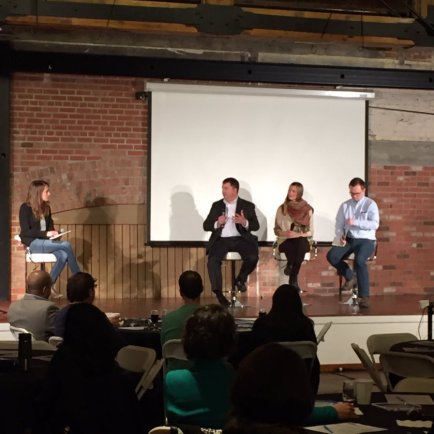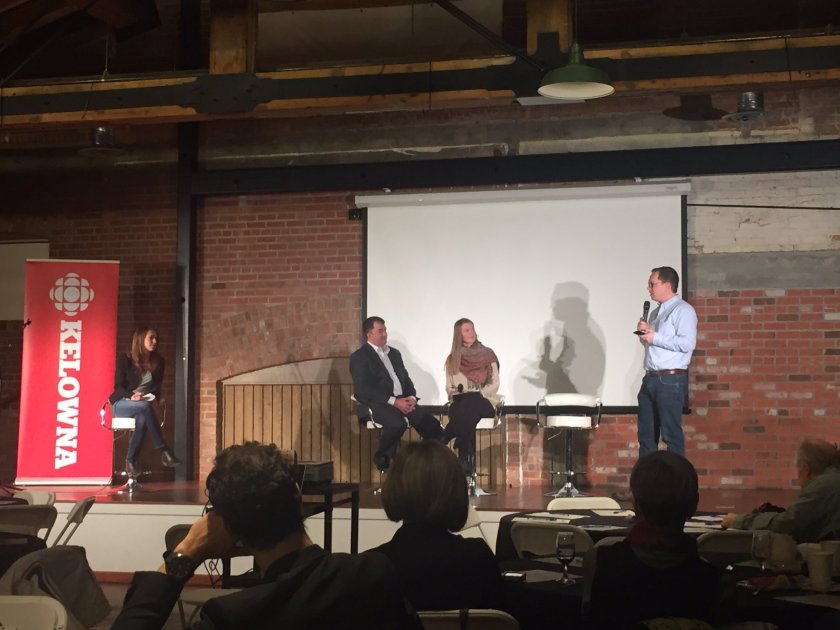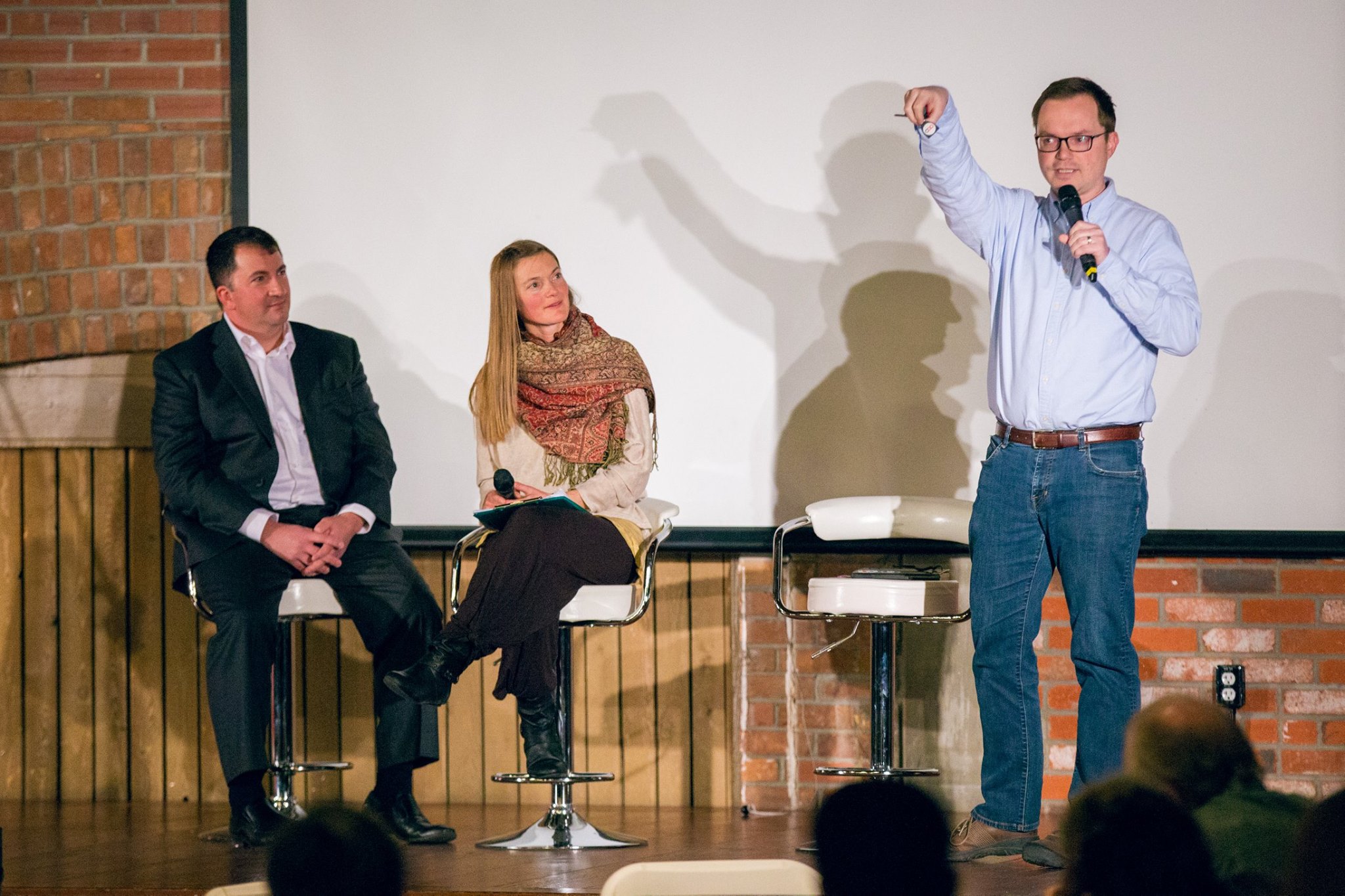Me providing (unpaid) plug of OGO Carshare on stage. Photo credit: Deon Nel Photography
Urban Systems rounded out their series of workshops on housing, the economy, and climate with their fourth and final workshop on Transportation. The evening focused on thinking about how transportation could enable vibrancy in the community.
I shared the panel with autonomous vehicle enthusiast Joseph Hlady and Lisa McIntosh, one of the founders of Urban Harvest Organic Delivery. You can read a bit of a roundup of each of points of view in the Kelowna Capital News.
As you can see, there was a bit of diversity on the stage. Lisa McIntosh was closer to my position of less car usage overall, but Joseph Hlady went a completely different direction. He painted a wondrous if ambiguous future of autonomous vehicles providing last-mile transportation support to the elderly and disabled. His vision had people using automated rideshare, rather than purchasing their own cars. Of course, he neglected to say what international venture-backed behemoth would inevitably own these vehicles.
He argued from the perspective of efficiency, how automated cars would mean less vehicles on the road, and from safety (less auto accidents) and accessibility. To me, this came off as just arguing for a more efficient version of the terrible system we already have, rather than a more radical vision of what we need.
Joseph argued against light rail and other forms mass transit, and actually argued that AVs would allow Kelowna to remain spread out. This floored me and many people in the audience. We just spent the last 3 sessions of OnPoint talking about YIMBYism, and the need to densify.

A future of every individual being whizzed around in little tin cans is exactly the opposite of what I argued for on stage. My position is that we need to abandon car culture, the real cause driving our current disastrous environmental, economic and social transportation system.
In North America, car culture is not just a symptom of the suburbanization. It was made even more widespread by piggy-backing on the simultaneous rise of popular culture — television and mass media adoption — in the 1950s and 1960s. Think of all the top 40 songs (Pink Cadillac, Mustang Sally, Low Rider, etc.), the films and movies stars featuring cars (James Dean, James Bond, and later Knight Rider) that over the years have socialized us, changed the way we build our cities, and even our coming of age ceremonies. For example, when I say “16th birthday” the first thing that pops into the mind of a North American is “driver’s license.” And since the post-war period, combined with the financialization of our lives, it has gotten much worse.
People have been complaining about the antisocial effects of car culture for decades. In The Private Future (1973) Martin Pawley called the automobile “the shibboleth of privatization; the symbol and the actuality of withdrawal from the community.”
It is from this perspective that I argued against car ownership on stage. I spoke to the crowd of transportation in other countries, and of my experience in Kelowna without a car (and did some unpaid plugging of OGO Carshare while I was at it 😉). My goal was simply to serve as an example: to be a living, breathing, “walking” anecdote to show that it is possible to live car free in Kelowna.

Previously on this blog I have written about the financial benefits. On stage I spoke of those, and tied it to densification. Often people argue that they must live away from city centers where rent is too expensive, and since they live too far away they need a car to commute. My thinking is, if a car costs on average $10,456 per year just in maintenance, gas, insurance, etc. you could save yourself the hassle, and have an extra $871 a month (10456/12) for rent to live closer to where you work or play. Even if you heavily use OGO Carshare to fill in the gaps (I spend about $3K a year) you will still have $621 extra monthly for increased rent. Plus, you won’t have the financial and psychological burden of having car loans… and who needs a car when you will have such a high moral horse to ride around on? 😉

Rethinking how you determine your transportation needs by calculating total cost of ownership is just one angle. I really wanted to get across the positive social aspects of not owning a vehicle: sharing rides and socializing with people; public transit as one of the last common cultural touchstones in our hyper-individualistic world; the small social acts of simple greetings to strangers on your morning walk to school or work. It is easy to lose touch with your community if the only way you ever see it is when you traverse it via those drab grey grids, solitary in your tin can.
So, how can we initiate this cultural shift? How can we make double cab long box pickups with “sick lift” uncool in our community? Other than making some action movies with lots of shaky-cam and multi-cut edits of the heroes walking, what cultural tools can we deploy alongside political and economic levers to improve our transportation system? This was my challenge to the crowd at OnPoint.


